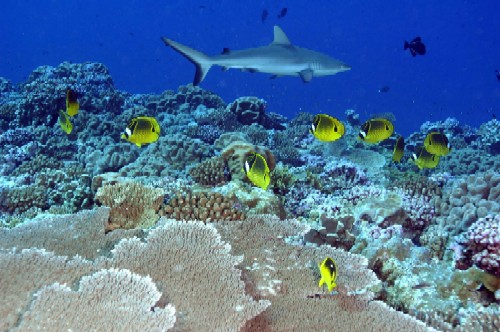Journey to a Prehistoric Reef in the Line Islands
 There are few pristine places left in the ocean, and our understanding of what is natural has shifted dramatically over time. But in the Line Islands there is an atoll where the corals are healthy and sharks are king. Last month, in support of our Oceans as Wilderness campaign, marine ecologist Dr. Enric Sala visited the Patagonia campus in Ventura and gave a fascinating talk about how we need to reeducate ourselves on what constitutes a healthy marine ecosystem so we can truly gauge the impact humans are having on the ocean. Patagonia Westport store manager Nate Paulson, who’s here working with the Environmental Department, recounts the presentation for us.
There are few pristine places left in the ocean, and our understanding of what is natural has shifted dramatically over time. But in the Line Islands there is an atoll where the corals are healthy and sharks are king. Last month, in support of our Oceans as Wilderness campaign, marine ecologist Dr. Enric Sala visited the Patagonia campus in Ventura and gave a fascinating talk about how we need to reeducate ourselves on what constitutes a healthy marine ecosystem so we can truly gauge the impact humans are having on the ocean. Patagonia Westport store manager Nate Paulson, who’s here working with the Environmental Department, recounts the presentation for us.
“What is Natural?” asked Dr. Enric Sala as he launched into a presentation about his 2005 expedition to the Northern Line Islands in the Pacific.
His findings and suggestions were remarkable: not only have perceptions about underwater wildness shifted away from that which is truly wild, but also the dive industry and some members of the scientific community actively promote and support a degraded view of the natural state. In other words, the baseline for what we perceive as pristine and wild has shifted.
Dr. Sala’s team made four stops, traveling south to north along the island and atoll chain beginning at an island with 10,000 people, then 2,500, then 10, and ending at one with zero people. The expedition was designed to begin in a place with an expected great deal of human degradation to the ecosystem, and progress through ecosystems with less and less human impact before reaching the nearly untouched final destination.
Initial findings were surprising: more fish were found in areas withmassive amounts of degradation than in pristine waters. Biomass, though(the amount of living material supported by the ecosystem) wasinversely proportionate to fish counts; the island with no peoplesupported four times the biomass of the one with 10,000 people.Additionally, the bacteria count in the water column increased by over1,000% near the heavily populated island as algae populations thrived.
Dr. Sala’s images were striking and helped illustrate complexunderwater relationships. The water near the heavily populated islandappeared cloudy with substantial algal growth and almost exclusivelybleached and dead coral. In stark contrast were images from theunpopulated island, where algae were nearly nonexistent and coraldiverse and vibrant. Most importantly, Shark populations increased ashuman degradation decreased, accounting for the substantial rise inbiomass.
A traditional terrestrial pyramid model, with top predators at theapex, other carnivores below, and herbivores at the foundation, seemedturned on its head by the observations. Dr. Sala noted that in apristine reef, the bulk of biomass was Shark, with other carnivores andherbivores tapered below: an inverted pyramid. In a healthy system,Sharks push the smaller creatures to reproduce and scavenge moreefficiently, cleaning up the algae (reducing energy supply forbacteria) and reaching a state of equilibrium in the ecosystem.
This wild state is long gone in the Caribbean, though the dive industryhas propped up a misconception that somewhere in the middle of thecontinuum of wildness that Dr. Sala’s team observed in the NorthernLine Islands is the definition of “wild.” Visually, it seems true –there are more small tropical fish in a degraded environment — but thelack of sharks, the algae-covered coral and the overall health of theecosystem, when measured against the pristine reef around theunpopulated island, is inarguably compromised.
“We need a true baseline to remind us!” Dr. Sala passionately extolledat the conclusion of his speech. Remind us of what wildness truly is;about how unfettered nature works. The hope is that places like thistiny unpopulated island will gain protection as marine reserves andbegin to shift our perceptions of wildness back towards the pristine.It’s the best shot we’ve got.
[With thanks to Dr. Sala and his team for visiting Patagonia. Photo: Zafer Kizilkaya]
